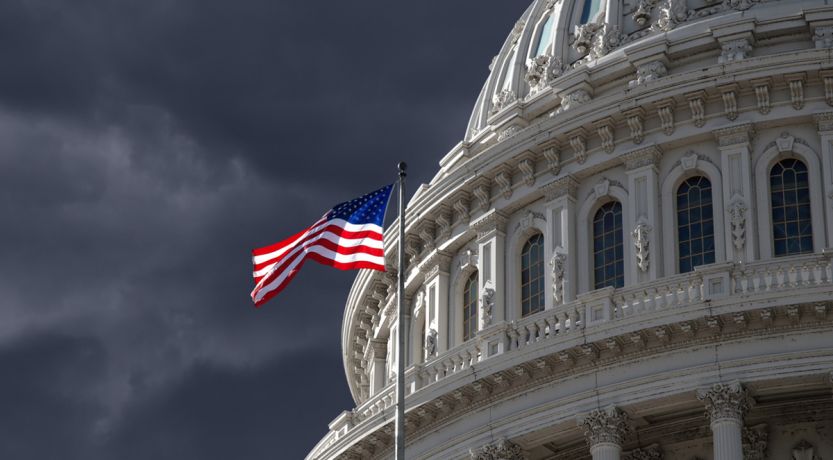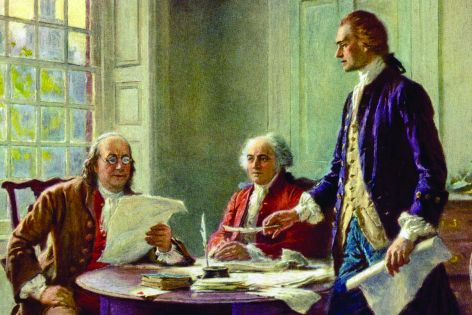The Fourth of July: The Legacy and Decline of Democracy
Considering history, democracy and the state of our world today, here are some thoughts for Americans to ponder this Fourth of July.

On July 4 Americans will celebrate Independence Day (or the Fourth of July, as it’s more commonly called in the United States). For many Americans, the celebration is about fireworks and picnics without much thought to the historical significance of the day.
In the midst of a presidential campaign in which both candidates claim the other is a threat to American democracy and survival, this year it’s particularly important for Americans to reflect on the historical significance of the Fourth of July.
So, what do we need to consider about democracy as we mark the Fourth of July this year?
Marking 248 years of American democracy
This year will mark the country’s 248th anniversary of independence from Great Britain. To be historically picky, the United States wasn’t technically independent until 1783, when the Americans and British signed the Treaty of Paris, ending the seven-year American Revolutionary War.
The Declaration of Independence from Great Britain was signed 248 years ago. 
But the idea that governmental power comes from and is accountable to the people—the core idea of democracy—was not a foregone conclusion after the last shot of the Revolutionary War was fired.
Many military officers, seeing the political disorder the young nation was facing, tried to persuade George Washington to declare himself the king or emperor of the new nation.
With the loyalty he had among the Continental Army and his popularity with the people, Washington could have done this and taken the young nation in a completely different direction. But, in an act that saved America as we know it, on Dec. 23, 1783, he surrendered his military authority to Congress and resigned his commission.
Nearly six years later, the new nation approved its Constitution, which has been in effect for 235 years now—the longest-lived codified Constitution in human history. (The unwritten British constitution can be traced back to the Magna Carta of 1215 and is made up of the accumulated body of laws enacted by the British Parliament and courts.)
The legacy of the Anglo-Saxon nations
One of the greatest legacies the British and Americans have given the world is representative democracy. The examples of these two nations showed the world that the principles of limited government and rule of law could be applied on a grand scale. (Before, it was widely believed that a republic or a democracy could work only on a small scale, for instance, in the Greek city-states.)
Though rarely extolled by modern scholars, one of the greatest legacies the British and Americans have given the world is representative democracy.
The British Parliament (often nicknamed “the Mother of Parliaments”) was the model for scores of sovereign nations that emerged after the decline of the British Empire.
According to the CIA’s World Factbook, there are around 107 parliamentary democracies worldwide, most of which were formerly under the rule of Great Britain. (Though it must be noted that the parliamentary democracies of some nations are more form than substance.)
Though sometimes unsuccessful, the retreating British tried to leave their former colonial possessions with functioning democracies that would maintain the rule of law and human rights.
After World War II, the United States made it a foreign policy goal to promote democracy around the world—of course, within the context of the Cold War competition with the Soviet Union. Had America not done this, many nations could easily have fallen within the communist realm or to homegrown dictatorships.
The global retreat of the democratic order
In 1989 Francis Fukuyama published an essay titled “The End of History?” (which was expanded and published as a book in 1992). Mr. Fukuyama’s essay argued that man had reached the end of his ideological evolution and that Western-style liberal democracy was “the final form of human government.”
He argued that the wars and conflicts that dominated most of human history would end, replaced by a new, stable democratic world order that would make warfare the exception, not the rule.
But that idea is now history.
We live in a world where the efficacy of democratic institutions is not only being questioned, but being openly rejected.
In his article “Democracy in Decline” in the July/August 2016 issue of Foreign Affairs, Larry Diamond wrote: “Between 2000 and 2015, democracy broke down in 27 countries, among them Kenya, Russia, Thailand, and Turkey . . . Meanwhile, many existing authoritarian regimes have become even less open, transparent, and responsive to their citizens” (p. 151).
Freedom House, a website that tracks democracies around the globe, reported that, “Global freedom declined for the 18th consecutive year in 2023. The breadth and depth of the deterioration were extensive. Political rights and civil liberties were diminished in 52 countries, while only 21 countries made improvements.”
Some reasons for this trend include:
- The sense that democracy and capitalism have led to inequality and lack of security.
- The growing sense that democracy is incapable of solving problems like inflation, economic decline, corruption and immigration.
- The United States’ retreat from being the global hegemon and promoter of democratic institutions around the world.
- The increase in global armed conflict around the globe.
- The growing influence of China and Russia in promoting their unique forms of authoritarianism as better alternatives to Western-style democracy.
Why is the decline of democracy significant?
In general, functioning democracies are less prone to go to war (especially against each other) and are less likely to commit human rights atrocities (since they are accountable to their citizens). When democracies were on the rise in the post–World War II world, the number of conflicts decreased.
For students of Bible prophecy, this is significant because in the end times global warfare and tension is prophesied to increase (Matthew 24:6).
The decline in democracy around the world could be a factor that will contribute to the end-time conditions Jesus Christ described in the Olivet Prophecy: “For nation will rise against nation, and kingdom against kingdom” (verse 7).
Reflecting on the legacy of democracy
As Americans celebrate Independence Day this year, they should consider the significance of the document that was ratified 248 years ago.
That document has inspired other peoples and nations through its most powerful line: “We hold these truths to be self-evident, that all men are created equal, that they are endowed by their Creator with certain unalienable rights, that among these are life, liberty and the pursuit of happiness.”
Though democracy has contributed to freedom and prosperity, the dark side of democracy is that it has also facilitated our national moral decline.
As democracy wanes in many parts of the world, causing global instability and danger, Americans would do well to thank God for the stability this nation has experienced for the last two centuries, but also to soberly reflect on our nation’s spiritual state.
Though democracy has contributed to freedom and prosperity in this country, the dark side of democracy is that it has also facilitated our national moral decline.
When practiced properly, democracy can improve the human condition by limiting tyranny and giving people the freedom to make their own choices. But with that freedom also comes the freedom to make wrong choices—and wrong choices multiplied by many people over a long period of time engender cultural decay.
What can you do?
That is the condition in which America finds itself today—a nation in moral and cultural decay, not only ignoring God, but openly defying Him.
There is little that individuals can do to change this nation’s moral slide—but what you can do is change your own moral direction with, as the Declaration of Independence says, “a firm reliance on the protection of divine Providence.”
To learn more about the prophetic significance of this American holiday, read “The Fourth of July in Prophecy.”
Date Posted: July 4, 2024



